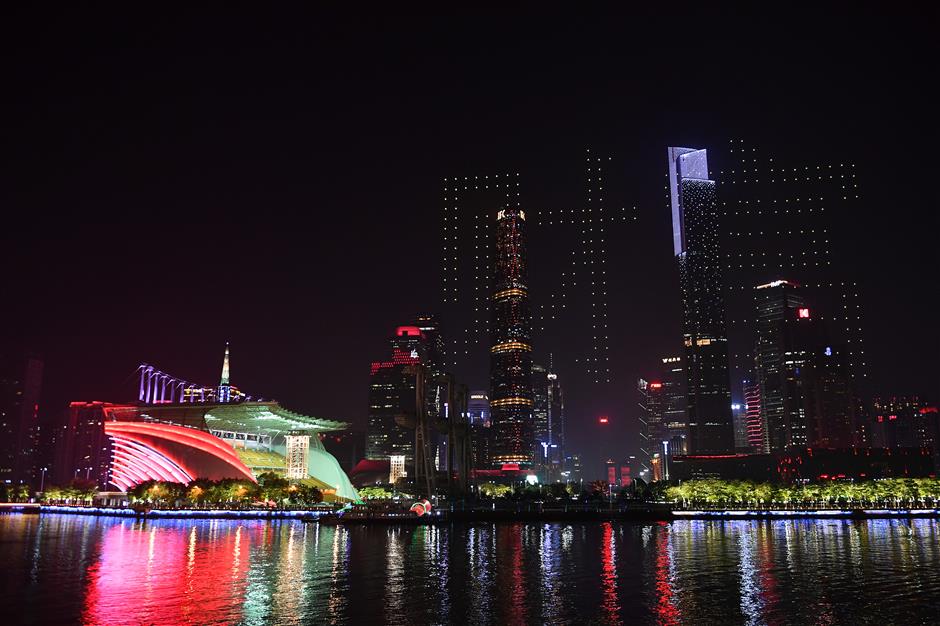China's commitment to globalization, innovation propel creation of better world

A total of 1,180 drones form two Chinese characters Caifu, or fortune, in the air in Guangzhou on December 7.
China's unswerving backing for globalization and innovation will spur the construction of a community with a shared future for mankind and the creation of a better world.
This is the message of the 2017 Fortune Global Forum on Dec. 6-8, a gathering of prominent business and academic figures as well as policymakers from around the world.
The attendees said China's achievement in boosting an open economy and innovation presents great opportunities for the rest of the world and will enable more countries to drive their development onto the fast track.
CONFIDENCE IN GROWTH, INNOVATION
China will not close its door to the world, and will only become increasingly open, with its business environment becoming more open, transparent and regulated, Chinese President Xi Jinping said in a congratulatory letter on the opening of the forum Wednesday.
China will continue to forge global partnerships, expand common interests with other countries, further liberalize and facilitate trade and investment, Xi said.
The encouraging note was welcomed by top executives of multinational companies who expressed optimism about China's economic growth and its reassured policy support in this regard.
"I am very confident about this country if it is still talking about globalization, opening up policy and entrepreneurship," said Jack Ma, founder and chairman of China's e-commerce giant Alibaba during an on-stage interview at the forum.
The most important part about globalization, according to Ma, is "how we can make it more inclusive by supporting young people, supporting developing countries and supporting small businesses."
The sentiment was echoed by Borje Ekholm, president of Sweden-based network and telecommunications company Ericsson who is happy to see China's ambition to strengthen global partnership through further opening up and innovation.
In 2016, China's digital economy grew 18.9 percent and contributed 22.6 trillion yuan (3.35 trillion U.S. dollars) to the country's economy, according to a report from the Chinese Academy of Information and Communications Technology.
Tim Cook, CEO of American technology company Apple Inc., emphasized the importance of China to his company, both as the primary place for manufacturing iPhones and iPads and as a market for its products, saying the No. 1 attraction of China for manufacturing is the "quality of people."
He spoke highly of the innovative spirit China has demonstrated over the past years, noting that the country is already "incredibly innovative in so many areas."
China has made breakthroughs in a number of fields of telecommunications and has pioneered in areas ranging from shared bikes to payment through smart phones.
"There are apps and business models that could only have been created here," Cook said.
EFFORT FOR COMMON DEVELOPMENT
The forum took place as China is pressing ahead with comprehensive development in accordance with the blueprint drawn at the landmark 19th National Congress of the Communist Party of China in October.
Apart from its economic and technological progress, China is always committed to creating favorable conditions for building a community with a shared future for mankind, a concept put forward by President Xi in 2013.
Now the concept is being put into practice through the Belt and Road Initiative, a cooperation platform for countries concerned to realize their common development.
The Belt and Road Initiative, which comprises the Silk Road Economic Belt and the 21st Century Maritime Silk Road, aims to build a trade, investment and infrastructure network connecting Asia with Europe and Africa along and beyond the ancient Silk Road trade routes.
Official statistics show that so far Chinese businesses have helped build 75 economic and trade cooperation zones in 24 countries along the Belt and Road, generating over 209,000 jobs.
The new policies, including the Belt and Road Initiative, and the continuous transformation of the Chinese economy create great opportunities for companies to participate in the growth, said Jon Stanton, CEO of the Scotland-based engineering company Weir Group Plc.
The Belt and Road Initiative, said Andrew Robb, former Australian trade minister, can dovetail with Australia's strategy to develop its northern region based on win-win cooperation.
The initiative has "played a significant role in helping Australia to develop her northern region," Robb told Chinese reporters.
Papua New Guinea's Prime Minister Peter O' Neill said his country, like others, will benefit from the 21st Century Maritime Silk Road as it will connect "our businesses more fully with China and the wider global market."















